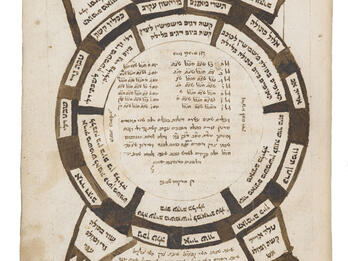Ari nohem (Roaring Lion)
Chapter Four
Why this knowledge, which is called “the science of kabbalah” [ḥokhmat ha-kabbalah] contradicts itself, and each one of these names (i.e., “science” and “kabbalah”) is not suitable to it, that the science of truth should begin from there.
Although it is the way of philosophical inquiry to first know if the thing exists and only afterwards what it is, this time we shall do the opposite: for in our inquiry into what this knowledge is, it has become clear to us that it is impossible for you to find it; for you know the saying of the wise man, that names are sealed definitions, and the definition is a clarified name. Thus, we shall give precedence to its name, and afterwards we shall treat its definition. And we will see that it is an imaginary spirit of an idea, which has no existence in the intellect. Its name, which they call it, as I have seen in books and as I have heard it called, is “the science of the kabbalah.” Sometimes the meaning of the word science expresses the science of truth alone; and if we understand that which is before us, then it is not possible to call it science and kabbalah together, nor is it possible to call it one of these terms alone: science or kabbalah. I am not ignorant of all of those who have struggled in its study, but the conjunction of the two is not justified in any way. For science is the knowledge of a thing according to its causes, and it is from the first intelligible features that the ensuing secondary concepts are derived, by way of philosophical inquiry and speculation. Whereas kabbalah (i.e., a received tradition) is something that we have heard, which that our elders have told us [see Psalms 44:2]; all we can do is trust in their words without adding anything at all. There is a customary saying that “if it is an authentic received tradition [kabbalah], then we shall receive it, but if it is only a logical deduction, then there is a rebuttal” [see, e.g., b. Keritot 15b] that is, by way of reasoning and wisdom. Thus, science and kabbalah are two contradictory terms being applied to one subject.
In fact, neither one of them alone is suitable to use in relation to this form of knowledge, that is, it is not suitable to call it by the name science, and it is even less suitable to call it by the name science of truth, nor is it suitable to call it kabbalah, a received tradition from Moses, may peace be upon him, as passed down to our generation. For it is neither the former, nor is it the latter. It is not science, for science is the knowledge of something by way of philosophical inquiry and speculation into its cause, and is the derivation of secondary qualities from the first intelligible, as we have said. And yet, in regard to this form of knowledge, philosophical inquiry and speculation is forbidden, as Naḥmanides, may his memory be for a blessing, has said in the name of the kabbalists. He is the head of the new generation of kabbalists, the first among them to say: “reasoning concerning it [kabbalah] is foolishness.” Many of them took this idea from him in order to express a similar idea themselves. R. Meir Gabbai in particular, in the first chapter of his Avodat ha-kodesh concerning unification, states as follows:
This science is the true kabbalah, which no intellectual inquiry can possibly attain. For it is above every intellect, and inquiry into it by way of reasoning is foolishness; the philosophical inquirer approaches it in vain, etc.
And in the introduction to Tola‘at Ya‘akov, he expanded upon this, saying:
Know that anyone who has not received secrets of the Torah from his teachers, but thinks to consider them by way of his own intellect, will indeed be interpreting the Torah inappropriately. This is included in the prohibition: You shall not make for yourself a graven image (Exodus 20:3). Its punishment in the world-to-come is great; and for all of this God will bring you to judgment for everything that is hidden [see Ecclesiastes 12:14]. Incline your ear and listen to the words of the wise men and their riddles. You shall not make for yourself a graven image; R. Isaac opened: Do not allow your mouth to cause your flesh to sin, etc. (Ecclesiastes 5:5). O how it is incumbent on a man to heed a command of the Torah without making a mistake in regard to it, and he should not derive from the Torah anything that he did not know and did not receive. Concerning this, it is written: You shall not make for yourself a graven image. The Holy One, has arranged it so that one is punished for this in the world-to-come.
And they should not tell me that this is only forbidden in regard to the elements. This is also the case with the sefirot, emanations, and other such things, and one may not innovate matters based on the same principles, for they prohibited this in every possible way. One is not allowed to inquire into it by way of reason, and one cannot reflect upon it and innovate. If this is the case, then also in regard to homiletic explanations of the scriptures, letter combinations, and gematria, it is forbidden to innovate in regard to it, whether it is a matter big or small. Now, although these people know this matter, they violate it every day, always. For the life of me! The aforementioned R. Gabbai states as much, that everything he said in his books Tola‘at Ya‘akov and Avodat ha-kodesh he received entirely from his teachers and did not consider anything according to his own opinion. Be that as it may, he admits that one should not inquire into it, and one should not compare it to anything by way of reason, nor should anyone consider it at all by way of intellect; thus, this is not science. Certainly, the approving name science of the truth should not be applied to them.
Credits
Leone Modena, Ari nohem (Roaring Lion): Neged ḥokhmat ha-kabalah ve-lomdeha, ed. Nehemiah S. Libowitz (Jerusalem: Darom, 1929), pp. 11–13.
Published in: The Posen Library of Jewish Culture and Civilization, vol. 5.




